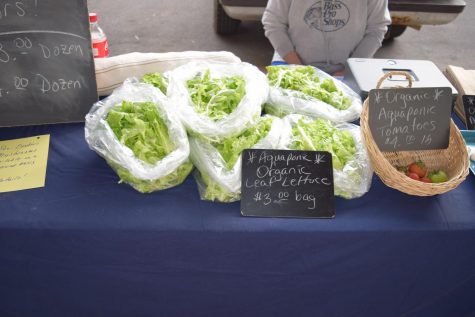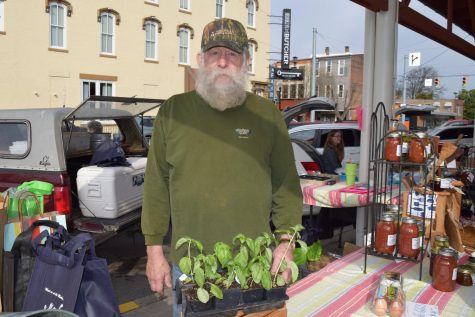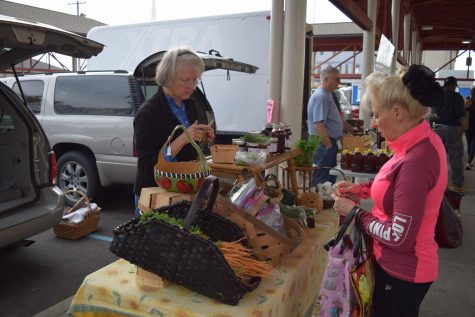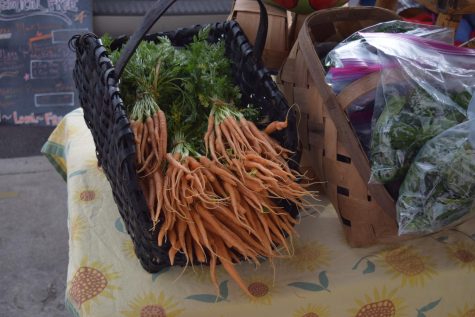Farming Techniques and the Southern Indiana Weather
Tis the season for farmer’s markets and business is steadily picking up according to local vendors. After an unusually mild winter several vendors from the farmer’s market in New Albany, Indiana talk about different farming techniques, and how the weather might affect them as it pertains to the methods they use.
D&N Aquaponics:
Dawn Wheatley owns a modest farm in Scottsburg, Indiana and has been farming for the past six years. D&N Aquaponics comes to sell a variety of vegetables at the New Albany Farmer’s Market. They have been selling at this market since they began farming.
“We’ve tried some of the other markets, but this is a good one,” Wheatley said. “There are always lots of people and really good crowds in the summer time. It is just a really nice market.”
She said during the winter they grow a lot of different lettuces such as bock-choy. They also grow tomatoes and mushrooms.
In the winter, they use a technique called aquaponics. Aquaponics is the combination of hydroponics- the technique of growing plants without soil and aquaculture-which means to raise fish. Practitioners of aquaponics raise fish and grown plants in an integrated system.

“We have big tanks of fish,” Wheatley said. “Then we have the grow beds where we raise our produce. The fish are getting fed and pooing in the water. That water is pumped into the grow beds and feeds the roots.”
The roots and the grow beds contain beneficial micro-organisms that break down the fish’s waste products and turns them into nutrients for the plants. This process also cleans the water which is siphoned back into the tank.
“It’s kind of like a circle of life kind of thing,” Wheatley said.
Wheatley said that as far as the milder winter goes, their aquaponics operation is not vastly affected by the weather.
“The way that our greenhouse is set up, it’s metal on three sides and the south side has polycarbonate panels,” Wheatley said. “The panels are set at just the right angle to get the sun in. The weather doesn’t really affect it unless it gets too hot or too cold.”
According to Wheatley they cannot utilize their greenhouse in the summer. In the summer time, they grow a variety of vegetables by row planting. Row planting is exactly what it sounds like, it is planting seeds in a straight line in evenly spaced rows in a tidy garden bed outside.
Wheatley said that it is yet to be seen what kind of effects the milder winter will have on their summer crops outside. She said she did have a few concerns though.
One of Wheatley’s primary concerns was that with the milder weather her fruit trees and her strawberries were beginning to bloom as early as late February. Once the plant blooms for the season it will not bloom again. She said that she was greatly concerned with getting another freeze which may kill those crops for the season, since getting frost in March or April in Southern Indiana is fairly common.
Once that threat passed she said her concern was that a milder winter might be the indication of a warming trend and that could mean a hotter than usual summer. She said the hotter weather coupled with a drought could really be detrimental to many farmers in the area.
Along with a hotter summer Wheatley said she is concerned that the bugs maybe worse than usual. Their produce is USDA certified organics so they are very limited on what they can do about pest control.
“We don’t use any [bug] sprays, not even ‘organic’ sprays,” Wheatley said. “If the problem is worse than usual, we could be at the mercy of the bugs.”
Russell Veggies:
Jimmy Russell from Russell Veggies located off Route 1 in Borden, Indiana has been farming for over 15 years. He said he does not mind the unusually warm weather this winter.

“It’s been great,” Russell said. “I’ve been growing stuff all winter.”
Russell said the only thing he is worried about this summer is the drought. He said he just knows that southern Indiana will experience a drought this summer.
“It’s dry right now,” Russell said. “In June, July, and August it’s going to get really bad. I just know it. We’ve had a good winter. Right now (late March), there’s three really big storms lined up. Then after that there is three more coming. Then it’s going to start getting dry.”
According to Russell his biggest concern with this impending drought is the extra labor it will take to get plants to grow. He said he has already started irrigating his fields in early March. He is confident that as long as he continues to irrigate he will not have too many issues this summer.
“You can make stuff grow if you water it,” Russell said. “It just depends on how well you take care of your vegetables.”
5 Acre Farms:
Ruby Wakeman is the owner of a five-acre farm located five miles south of Scottsburg, Indiana. She said thy grow a lot of lettuces and a few other less common vegetable varieties.

“I try to do different things like right now I have claytonia, arugula, and wasabi arugula,” Wakeman said. “I am trying a new thing this year called agretti, which is quite sought after by chefs.”
Agretti is a water retaining plant that grows in the Mediterranean which Food Blogga described as a cross between fennel fronds, rosemary, and grass. It is used in a variety of dishes and it can be fairly hard to find in the United States.
Wakeman grows produce by utilizing high tunnels. High Tunnels are also called hoop houses and they are temporary greenhouse type structures that help extend the growing season. High tunnels offer and intermediate level of protection against the climate. It has less climate control than an actual greenhouse, which are often much more expensive to build depending on the materials used to construct either structure.
“A high tunnel is just a plastic tunnel with no heat,” Wakeman said. “So, you have to compensate by putting row covers over things to protect them from the cold.”
Due to their growing method Wakeman said that to her the weather this winter has not been warm enough to really allow things to grow.

Wakeman said that near Scottsburg, Indiana they have still had a really cold bought or two, where the temperature dropped to around 17-18 degrees Fahrenheit and those really halted production.
“It’s all very new to me,” Wakeman said. “Learning when and where to plant things according to the seasons. Learning how things are affected by the weather.”
Wakeman said due to this learning curb, she is not sure how a possibly warmer summer might impact her operations, especially since she did not personally think this winter was all that mild.
Lost Creek Acres:
According to Alex Cooper from Lost Creek Acres, they are a diversified vegetable farm. They grow a large variety of salad greens, tomatoes, potatoes, and more.
“All told, we grow 35-45 different types of vegetables and 20 different types of flowers,” Cooper said.
When it comes to farming methods, Cooper said they follow the lead of Eliot Coleman, who is a successful farmer, agriculturalral researcher and educator, and has written several books on modern organic farming.
Some of the more modern techniques Cooper said they were trying is extensional farming, which means extending the farming season into the fall and winter by rotating crops and growing seasonal vegetables.
They are also trying a technique that has been dubbed as plastic farming. It is the use of plastic row covers and plastic mulches to help control the soil temperature and to help reduce soil compaction.
According to Cooper the main concern he has with the unseasonably warmer weather this winter, is that many weather and farming experts are predicting an unusually hot summer this year.
“It can really affect certain plants,” Cooper said.
Cooper said that even hot weather plants such as tomatoes really do not grow well in temperatures above 95 degrees Fahrenheit.
“It will mean[putting] a lot of labor and time into getting plants to move along,” Cooper said. “Many of our fruits and vegetables are blossom plants. If it gets too hot their blossoms will wither rather than produce fruit. It will mean a lot of loss.”
Cooper said there was a brightside to the warmer weather this winter.
“A warmer winter means it is easier to produce spinach and stuff like that,” Cooper said. “It makes our season extension more reliable.”
According to Cooper they had a lot more produce to sell this winter.
“January and February were unusually good months for us as far as sales go,” Cooper said.
Cooper said there are a lot of benefits to being a smaller scale farm versus a large-scale farm when it comes to unusual weather patterns and climate change.
He said that many large farms depend on mass production of one to a few warm weather crops during the typical growing season (spring -summer). Whereas smaller farms tend to grow a bigger variety of vegetables on a much smaller scale. This means that they are not reliant on just one or two types of vegetables that might fail to grow in drought.
According to Cooper smaller farms not only tend to grow a bigger variety of vegetables but it is also easier and less to try out different farming techniques to combat climate changes on a smaller scale.
He said some smaller farms may even be able to learn how to get some benefits out of climate change.
“There’s been more of a trend of extreme heavy rainfall in our area in the springtime and then extreme drought in the summer,” Cooper said. “We are building our farm businesses to kind of eliminate the problems that stem from that.”
Grass Corp:
Not every farm raises vegetables as their main source of income. Grass Corp’s main source of income comes from raising animals. However, according to Garth Steckler, they prefer to be referred to as a grass farm.
“We are a grass only operation with only animals” Steckler said. “Although in that we have great diversity, we farm cows, sheep, pigs, chickens, turkeys, and rabbits. We use no hormones, antibiotics or GMOs, and only natural farming practices. The farming practices that we use revolve around the grass, as we see ourselves as grass farmers rather than livestock farmers.”
According to Steckler the farming practices they use revolve around the grass. They primarily use a style of Management Intensive Grazing, which basically means that they use electric fencing to concentrate the animals on one small section of pasture at a time.
Steckler said this allows for three primary benefits. One, it gives the livestock a fresh salad of forages every day, for most of their animals twice a day, which the animals much prefer because once they have been on a spot for a while it gets trampled and poop/urine covered.
Two, since the animals are only on a small portion of the farm at a time, the rest of the pasture gets to rest most of the time, Steckler said this greatly improves the quality and production of the forages as they get a chance to fully recover and build a root reserve between grazings rather than get constantly chewed off as soon as they start to grow.
Three, this concentrated group of animals gives an equal amount of trampling and disturbance to all parts of the pasture as well as equal distribution of poop/urine. Steckler said without this constant moving the cows tend to concentrate themselves nearest the shade and water.
“The larger animals are kept concentrated by a single strand of electric fencing, while the turkeys and laying hens are kept close to their shelters by an electric netting, and the broilers (meat chickens), are in small portable pens,” Steckler said. This style of grazing, as well as only feeding grass to the ruminants and as much grass as possible to the pigs and chickens, as well as not chemical fertilizers, hormones, pesticides or GMOs, is the base of our operation for providing the healthiest food possible.”
As for the warmer winter, Steckler said he personally loved it. He said the weather was beneficial for his farm because they had a lot of projects outdoors they needed to accomplish. The milder weather allowed them to get them done during the winter rather than putting them off until spring.
“For us, since we only grow grass, it was fairly beneficial,” Steckler said. “It gave us just a tad bit of a leg up as far as a little bit of an earlier green-up, and it allowed us to get the animals out just a tad bit earlier.”
Steckler said there may be a major disadvantage to the warmer winter, but as of right now it is only hypothetical.
“The only downside that we know of that has the possibility to significantly negatively impact our operation is if the lack of super cold weather this winter failed to kill all of the funguses and diseases, both for soil and plant species,” Steckler said.
He said that so far, they have not seen any effects from this. However, he said that if this Spring and Summer is like last year, in which there was a brief period of heavy rains followed by a very dry spell they might experience some issues. Steckler said the extent and impact of these issues is still unknown.

